Related Research Articles

Liberia, officially the Republic of Liberia, is a country on the West African coast. It is bordered by Sierra Leone to its northwest, Guinea to its north, Côte d'Ivoire to its east, and the Atlantic Ocean to its south-southwest. It has a population of around 5 million and covers an area of 111,369 square kilometers (43,000 sq mi). English is the official language, but over 20 indigenous languages are spoken, representing the numerous ethnic groups who make up more than 95% of the population. The country's capital and largest city is Monrovia.

Liberia is a country in West Africa which was founded by free people of color from the United States. The emigration of African Americans both free and recently emancipated, was funded and organized by the American Colonization Society (ACS). The mortality rate of these settlers was the highest in accurately recorded human history. Of the 4,571 emigrants who arrived in Liberia between 1820 and 1843, only 1,819 survived.
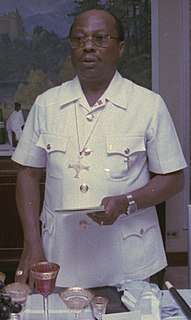
William Richard Tolbert Jr. was the 20th President of Liberia from 1971 until 1980, when he was killed in a coup d'état led by Samuel Doe.
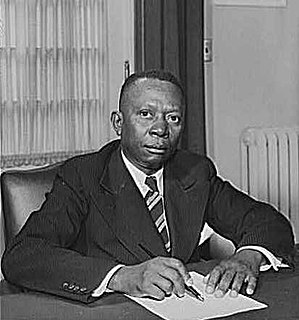
William Vacanarat Shadrach Tubman was a Liberian politician. He was the 19th President of Liberia and the longest-serving president in the country's history, serving from his election in 1944 until his death in 1971.
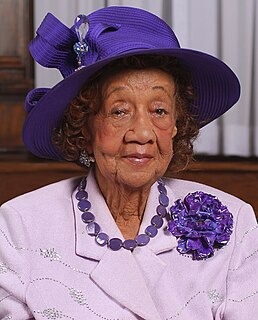
Dorothy Irene Height was an African American civil rights and women's rights activist. She focused on the issues of African American women, including unemployment, illiteracy, and voter awareness. Height is credited as the first leader in the civil rights movement to recognize inequality for women and African Americans as problems that should be considered as a whole. She was the president of the National Council of Negro Women for forty years.

The National Council of Negro Women (NCNW) is a nonprofit organization founded in 1935 with the mission to advance the opportunities and the quality of life for African American women, their families, and communities. Mary McLeod Bethune, the founder of NCNW, wanted to encourage the participation of Negro women in civic, political, economic and educational activities and institutions. The organization was considered as a cleaning house for the dissemination of activities concerning women but wanted to work alongside a group who supported civil rights rather than go to actual protests. Women on the council fought more towards political and economic successes of black women to uplift them in society. NCNW fulfills this mission through research, advocacy, national and community-based services and programs in the United States and Africa. NCNW serves as a super organization which acts as a cohesive umbrella for the other African American groups that already existed. With its 28 national affiliate organizations and its more than 200 community-based sections, NCNW has an outreach to nearly four million women, all contributing to the peaceful solutions of the problems of human welfare and rights. The national headquarters, which acts as a central source for program planning, is based in Washington, D.C., on Pennsylvania Avenue, located between the White House and the U.S. Capitol. NCNW also has two field offices.
Wednesdays in Mississippi was an activist group during the Civil Rights Movement in the United States during the 1960s. Northern women of different races and faiths traveled to Mississippi to develop relationships with their southern peers and to create bridges of understanding across regional, racial, and class lines. By opening communications across societal boundaries, Wednesday’s Women sought to end violence and to cushion the transition towards racial integration.
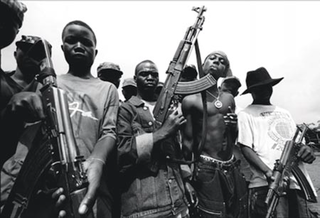
The Second Liberian Civil War began in 1999 when a rebel group backed by the government of neighbouring Guinea, the Liberians United for Reconciliation and Democracy (LURD), emerged in northern Liberia. In early 2003, a second rebel group, the Movement for Democracy in Liberia (MODEL), emerged in the south, and by June–July 2003, Charles Taylor's government controlled only a third of the country.

Ellen Johnson Sirleaf is a Liberian politician who served as the 24th President of Liberia from 2006 to 2018. Sirleaf was the first elected female head of state in Africa.

Clarence Lorenzo Simpson Sr. (1896–1969) was a politician in Liberia. He was Secretary of State during much of World War II (1934–1943) under President Edwin Barclay. He also served as ambassador to the United States.
Albert Porte was an Americo-Liberian political journalist and dissident who was the editor of the Crozerville Observer. In 1946, he became the first Liberian journalist to be imprisoned by President William Tubman. The first major movement toward civil society in Liberia is traced back to Porte's activities.

General elections were held in Liberia on 1 May 1951, the first to be held under universal suffrage, as previously only male descendants of Americo-Liberians had been allowed to vote. This was the first elections in Liberia where women and the local Liberians owning property were allowed to vote based on a Constitutional Referendum in 1945–46. In the presidential election, William Tubman of the True Whig Party was the only candidate, and was re-elected unopposed.
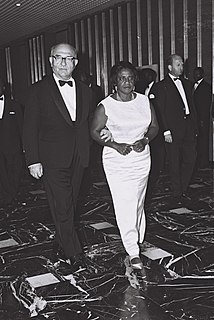
Antoinette Louise Padmore Tubman was the wife of the Liberian politician William S. Tubman and was First Lady of Liberia from 1948 until 1971.
Richard Magnus Franz Morris was a Liberian business and civic leader.
A. Doris Banks Henries was an American educator and writer in Liberia, and Assistant Minister of Education during the Tolbert administration.

Edison Reginald “Reggie” Townsend was a Liberian journalist and statesman known for the establishment of Liberia's Information Services. He served as Secretary of Information and Cultural Affairs under President William Tubman, and as Minister of State for Presidential Affairs under President William Tolbert. In 1979 he was elected National Chairman of the True Whig Party. Following the 1980 Liberian coup d'état of President Tolbert on April 12, 1980, he and several other members of the Tolbert administration were put on trial and without due process executed by firing squad on April 22, 1980.

Liberia–Soviet relations were the bilateral relations between Liberia and Soviet Union. Contacts between the two countries were sporadic during the 1950s and 1960s, improved during the 1970s but became frosty in the 1980s.
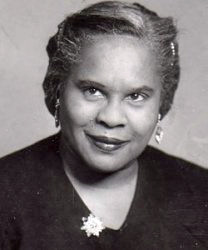
Vivian Carter Mason was a staunch advocate for gender and civil rights as well as an ardent supporter of universal education. She served as an influential president of the National Council of Negro Women (NCNW) from 1953 to 1957. She is well-known for founding the Women's Council for Interracial Cooperation in communities such as Norfolk and Arlington, Virginia in 1945. Mason also founded the Committee of 100 Women, which allowed for underprivileged children of color in New York City to attend summer camp for free.
Helen Abeodu Bowen Jones is a Liberian historian, politician and diplomat.
Maude Amelia Morris, née Lyon was a Liberian women's rights activist and rubber farmer.
References
- 1 2 3 Yatta Winnie Kiazolu (2020). "All The Women Are Meeting": The National Council of Negro Women, Emerging Africa, and Transnational Solidarity, 1935-1966 (PhD). University of California Los Angeles. pp. 43–47.
- ↑ J. Gus Liebenow (1987). Liberia: The Quest for Democracy. Indiana University Press. p. 100. ISBN 978-0-253-33436-7.
- ↑ Liberian Women’s Social and Political Movement. Constitution and By-Laws. (Ibadan, Nigeria: K.O. Dike Archives, May 7th, 1946), 1. Quoted in Maria Martin (2018). Ojo Nro: An Intellectual History of Nigerian WOmen's Nationalism in an Umbrella Organization, 1947-1967 (PhD). Michigan State University.
- ↑ Sarah Simpson George (March–April 1953). "A Statement on the Status of the Women of the Republic of Liberia". The Federation Journal. pp. 1, 5. Retrieved 1 February 2021.
- ↑ "The National Liberian Women's Social and Political Movement, 1946-1969, undated". British Library . Retrieved 1 February 2021.